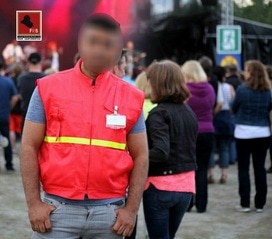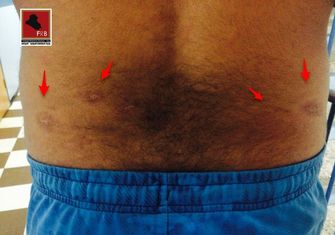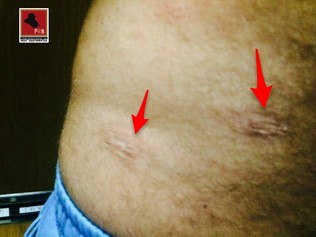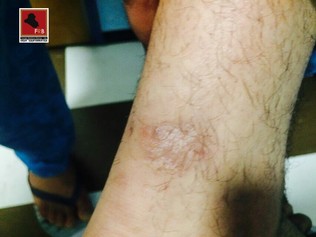Hussam's name has been changed to protect his and his family's identity, and his story has been edited for clarity and length.
The warrantless raid ended with his arrest, handcuffed and placed in the boot of a military Humvee.
“I felt a strange sense of relief on arrival. The realisation hit me ... I was to face the same as others before me … I'd be reduced to a corpse, and dumped on the side of the road. I never believed that such a thought could bring me relief, but that was before the torture I experienced at the hands of state forces”. Hussam spoke of a collective fear, for he knew that he was “not alone”, especially after spotting a friend who had disappeared some months before his arrest.
Hussam was taken to the Anti-terrorism prison in Muqdadiyah, one of the “most feared”, he told FRB.
“There are three ways one could survive” he went on to explain. “You either died from a 'sudden death' or a 'chronic illness' as would be printed on your death certificate. If you escaped alive, you would escape with a permanent disability, or facing death row at Nasiryyah prison, after confessing to something you did not do”.
On his arrival to the prison, Hussam was introduced to Brigadier 'Haleem'. During their encounter, Hussam recalled, “I was taken aback by the treatment he received. “The Brigadier himself was kind, asking me to sit, and having me un-cuffed. I soon learned that the treatment was conditional”.
The Brigadier asked Hussam if he was familiar with the 'special law' of the prison; a forced confession, in other words, to the charges pinned upon him. “They threatened to rape my sister if I failed to comply."
There was yet another twist. The Brigadier ordered a small force to take Hussam to a munitions factory run, as the Brigadier claimed, by Al-Qaeda operatives in Iraq. “Upon hearing his words my heart filled with panic and without thinking, I blurted out, who me Sir? His response was yes, you”.
Hussam served six years of his life to American forces, working as an interpreter, and helping with the arrest of Al-Qaeda members. He was dumbfounded by Brigadier Haleem's accusation, which he claimed had no basis in fact.
“It was another scare tactic designed to extract a false confession” he explained.
After some resistance, the plan to plant Hussam at the Al-Qaeda run munitions factory was called off. The imaginary scenario, as Hussam divulged, "was to be used as a pretext to justify my imprisonment".
The young Iraqi was taken to a torture chamber filled, in his own words, “with all kinds of equipment, and the smell of blood”.
“As I was escorted into the room I saw two chains dangling from the ceiling, known as Falaqa, and a space where my right and left foot would be chained.” The torture, Hussam told FRB, began immediately after he was locked into the chains, and a crumpled piece of cloth was rammed into his mouth. “They drew out a long wooden stick and repeatedly beat my testicles, so severely that my heart would sink right into my stomach”. Unable to endure the pain, Hussam blacked-out after 30 minutes. He was awoken by cold water cascading down his face and then, he remembers, “it started all over again”.
“I was asked by the torturer 'do you want to take us to the explosives site where you plant your bombs'? Without hesitation I said yes. Yes, out of fear of being tortured again, and the pain - it was intolerable.”
The following day Hussam's captors blindfolded and handcuffed him. “'Don't you dare change your mind now', an officer warned me”. They dragged me into the Brigadiers office who greeted us with a callous welcome, 'how is our lovely guest doing'” he said. At that moment I broke down, crying uncontrollably, and begging for mercy. I had promised to confess, but had nothing to give up”.
Hussam was taken back to a different torture chamber where he endured unspeakable horrors for another week, electrocuted and beaten with cables and metal rods, the marks of which he carries with him until today.
Eventually, Hussam delivered what his torturers wanted; a false confession, absent of any substantial details, to crimes he had not committed.
“I needed it to end” he expressed, “content with the fact that I would spend the rest of my life imprisoned”.
In the following days Hussam was bounced between more prisons; the combating terrorism prison in Diyala, the Baquba office for crimes, and several more.
At one of them Hussam met a Colonel that would change his life and restore his faith in humanity. The colonel was angered by the state that the men were brought to him in; swollen and barely able to walk or speak. Questions were asked about their incarceration, and after papers were signed, Hussam and others were free to leave.
Hussam described how he still struggles to comprehend why the Colonel ordered their release. He lived the following three years in hiding, having to relocate on several occasions to protect his family, but eventually fled Iraq for Finland. Even there he faces the risk of deportation, after Finish authorities in June this year, designated Iraq a 'safe' country.
He continues to anxiously await a verdict that will determine his future fate.





 RSS Feed
RSS Feed